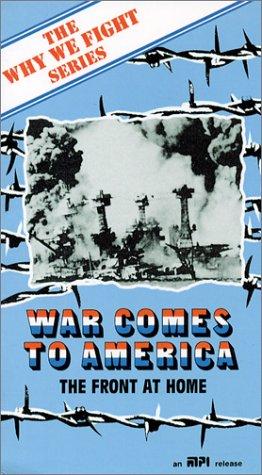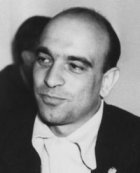
War Comes to America Page #4
- NOT RATED
- Year:
- 1945
- 70 min
- 91 Views
between Japan and China,
...are your sympathies with either side?
Only 43% were with China,
most of us were undecided.
In June 1939, when we were asked
the same question:
74% said we were with China.
Now our minds were made up.
When we loaded our scrap-iron on
Japanese ships, our citizens protested.
Let Mr. Acheson, Assistant Secretary of State,
tell us the inside of the story.
the restriction of exports to Japan,
...took the form of moral embargos
of air-planes and direct munitions."
Then Congress passed the Export Control Act."
And increasing cut offs of scrap iron, aviation
Gasoline and other strategic items followed."
Exports were curtailed to the limit, which those
responsible for our defense were willing to risk."
It was a fearful responsibility."
On one side was the possibility,
in fact the probability...
...that one day these materials
might be used against us."
On the other side was the possibility,
in fact the probability,
...to cut them off, would provoke an attack
which we were not then prepared to resist."
Finally in the summer of 1941,
...as it was becoming clear, that Japan was
turning its back on every possibility
of reconciliation and adjustment, and
was determined on her great gamble of conquest.
...all exports ceased.
April 9, 1940, the leaders of Nazi Germany
Shifted their war machine into high gear.
They overran into Denmark,
they smashed into Norway.
On May 10, 1940, they blitzed
into Holland and Belgium.
The Nazis are marching ahead at the fastest speed
a conquering army has moved in all history.
All roads in France are choked with
slow-moving masses of refugees.
Nazi dive-bombers are bombing countless of
thousands of defenseless woman and children.
Good-evening everybody. Tonight
it seems clearly apparent that...
...the first great phase of the war
in the west has been won by Germany.
The army of French and British has made
a valiant battle in its effort to...
...retreat to Dunkerque where there is
...some part of it can be evacuated."
Adolf Hitler's mechanized forces are
racing towards Paris...
...as French resistance collapses."
On this tenth day of June, of
nineteen hundred and forty
...the hand that held the dagger, has struck it
into the back of its neighbor."
This is William L. Shivers, speaking
from the forest of Campaign,
...where Adolf Hitler today is handing
his Armistice terms to France.
It is 3:
15 p. M. Adolf Hitler stridesslowly to the little clearing.
I can see his face. It is grave, solemn,
yet brimming with revenge.
Off to one side, is a large
statue of Marshall Foch.
Hitler does not appear to see it.
Now we see the French walking down the avenue,
Lead by General Huntziger.
Hitler and the other German leaders rise,
as the French enter.
General Keitel reads the preamble
to the German Armistice's Terms.
in a quarter of an hour.
Conquering armies now stood
on the shores of the Atlantic.
Fire!"
The danger was suddenly close.
Countries conquered by...
...the Nazis had possession outside of Europe.
Some of these possessions were in America.
Would the Nazi demand the French
Naval units at Martinique?
Would the Nazis move into the
Dutch oil fields of Curacao?
Would the Nazis seize the French Naval base
At Dakar for invasion of South America?
Already in Brazil, there were over
1 million Germans who lived exactly...
...as they did in Germany.
Twelve hundred German schools,
with Nazi textbooks and Nazi teachers.
Nazi newspapers. Gliding clubs
had been established.
Also in Brazil, there were 260 thousand
Japanese taking orders from Japan.
In Ecuador, within easy bombing range
of the Panama Canal,
German airlines had been established. German
pilots were reserve officers of the Luftwaffe.
The German transport planes, had
In Argentina, German athletic clubs,
similar to the Hitler Youth Movement,
...had been organized exclusively for Germans.
Here was a Fifth Column ready to take over.
Havana Conference for the defense
of The Americas. July 22, 1940.
Havana, we met with 20 other
American Republics.
There must not be a shadow of
a doubt anywhere,
...as to the determination of
the American nations,
...not to permit the invasion of their
hemisphere of the armed forces...
...of any power or any possible
combination of powers."
Twenty American nations stood firm.
The Americans would not let any European
colony in this hemisphere...
...to be transferred to
a non-American power.
We said KEEP OUT. We meant it.
We must increase production
facilities for everything needed...
...for the Army and Navy
for National Defense.
I believe that this nation
should plan at this time,
...that will provide us with
50 thousand military and naval planes.
To protect our shores, we authorized
construction of a two-ocean Navy.
The greatest the world has ever known.
At least it would be the greatest Navy,
...when completed in 1944.
But then, in 1940 it was only a paper Navy.
Our fighting forces at that time,
consisted of an army of 187 thousand men,
...a navy of 120 thousand, and this dot
was the air corps 22,387 strong.
All told, 330,000 men.
We had makeshift equipment.
Stove pipes for canons.
Bags of flour for bombs.
Trucks were labeled Tanks.
Our infantry had exactly 488 machine guns.
We possessed 235 pieces of field artillery.
Ten light and eighteen medium tanks.
That was the army of The United States
in May in 1940,
...the month in which
...so we called on the minute-men.
The National Guard of the 48th State.
And placed them into Federal Service.
And most important, Congress
passed the Selective Service Act.
For the first time in our history, we began
Mobilizing an army while still at peace.
"The first number is serial number 158."
"The second number which has just
been drawn is 192."
It wasrt too soon. Time was running out.
The Nazis had begun their shattering
blitz on Britain.
"Hello America. This is Edward Morella
speaking from London."
There were more German planes over the coast of
Britain today, then at anytime since the war began."
Anti air-craft guns were in action
along the south-east coast today,
...back on Main Street U. S.A."
Daily we followed Britairs life-struggle.
For if Britain died,
...we would be in grave peril.
the Atlantic, the British Fleet,
...might go to Nazi Germany.
We would be unprotected. Our shores,
our people, our homes, in danger.
Britain must not fall!
In our harbors idle and rotting
lay ancient destroyers.
but this was WW II.
And this gave us an idea. Fifty tired,
over-aged destroyers were re-vitalized,
...transferred to Great Britain.
In return, we acquired further
protection of our shores,
Translation
Translate and read this script in other languages:
Select another language:
- - Select -
- 简体中文 (Chinese - Simplified)
- 繁體中文 (Chinese - Traditional)
- Español (Spanish)
- Esperanto (Esperanto)
- 日本語 (Japanese)
- Português (Portuguese)
- Deutsch (German)
- العربية (Arabic)
- Français (French)
- Русский (Russian)
- ಕನ್ನಡ (Kannada)
- 한국어 (Korean)
- עברית (Hebrew)
- Gaeilge (Irish)
- Українська (Ukrainian)
- اردو (Urdu)
- Magyar (Hungarian)
- मानक हिन्दी (Hindi)
- Indonesia (Indonesian)
- Italiano (Italian)
- தமிழ் (Tamil)
- Türkçe (Turkish)
- తెలుగు (Telugu)
- ภาษาไทย (Thai)
- Tiếng Việt (Vietnamese)
- Čeština (Czech)
- Polski (Polish)
- Bahasa Indonesia (Indonesian)
- Românește (Romanian)
- Nederlands (Dutch)
- Ελληνικά (Greek)
- Latinum (Latin)
- Svenska (Swedish)
- Dansk (Danish)
- Suomi (Finnish)
- فارسی (Persian)
- ייִדיש (Yiddish)
- հայերեն (Armenian)
- Norsk (Norwegian)
- English (English)
Citation
Use the citation below to add this screenplay to your bibliography:
Style:MLAChicagoAPA
"War Comes to America" Scripts.com. STANDS4 LLC, 2025. Web. 20 Jan. 2025. <https://www.scripts.com/script/war_comes_to_america_23046>.



Discuss this script with the community:
Report Comment
We're doing our best to make sure our content is useful, accurate and safe.
If by any chance you spot an inappropriate comment while navigating through our website please use this form to let us know, and we'll take care of it shortly.
Attachment
You need to be logged in to favorite.
Log In